Managerial Economics Assignment: Platform Economy, Consumer Behavior
VerifiedAdded on 2023/04/21
|12
|3202
|496
Homework Assignment
AI Summary
This assignment solution analyzes the differences and similarities between the old and new economies, focusing on the platform economy. It explores whether these economies are mutually exclusive or beneficial, examining the roles of government, producers, and consumers in each. The solution also provides methods for consumers to avoid or limit lock-in situations and discusses the effectiveness of the price mechanism in solving scarcity problems. The paper delves into the intangible nature of the platform economy and its implications for government regulation, addressing issues of safety, crime, and the balance of power between consumers and producers. The assignment covers key economic concepts such as supply and demand, market power, and the impact of technology on business models.
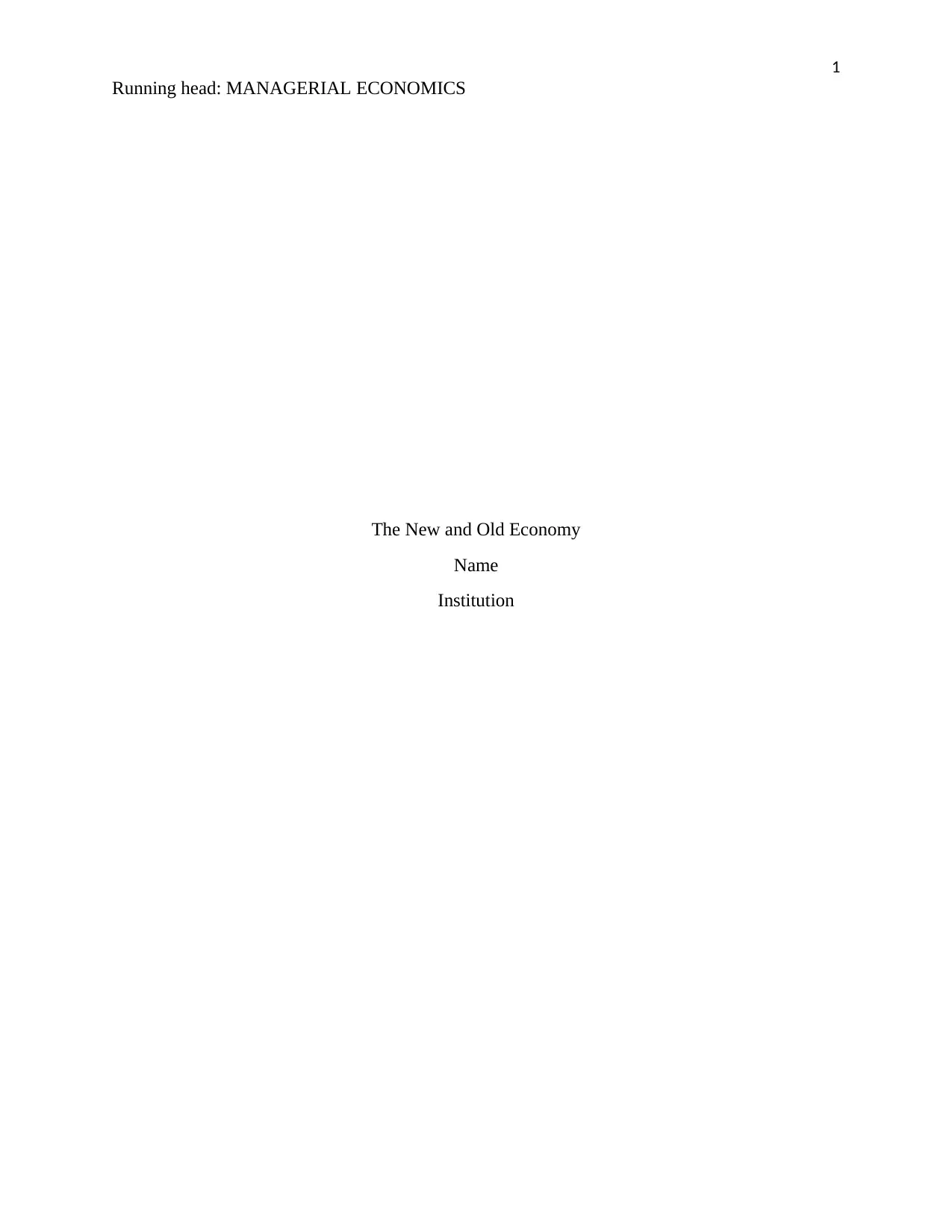
1
Running head: MANAGERIAL ECONOMICS
The New and Old Economy
Name
Institution
Running head: MANAGERIAL ECONOMICS
The New and Old Economy
Name
Institution
Paraphrase This Document
Need a fresh take? Get an instant paraphrase of this document with our AI Paraphraser
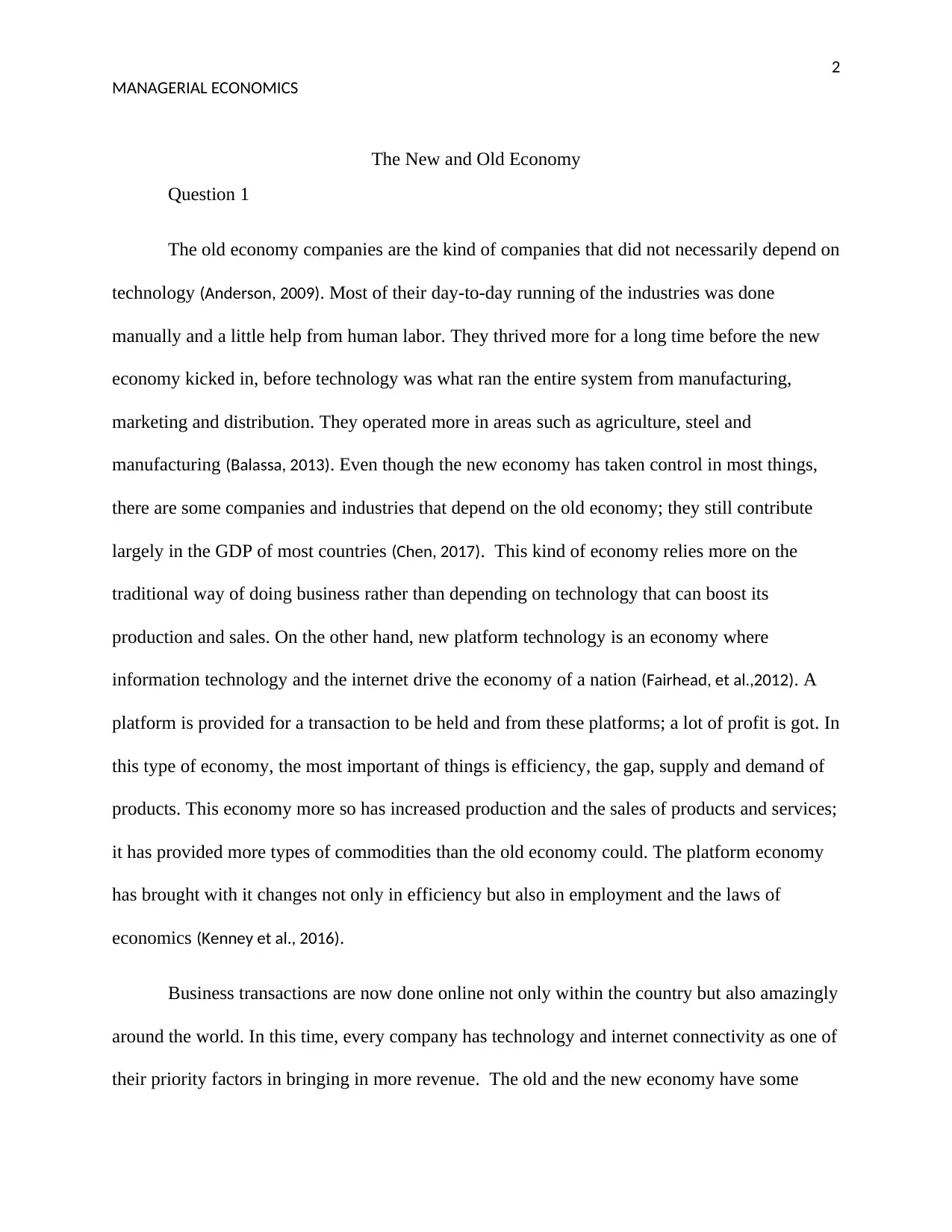
2
MANAGERIAL ECONOMICS
The New and Old Economy
Question 1
The old economy companies are the kind of companies that did not necessarily depend on
technology (Anderson, 2009). Most of their day-to-day running of the industries was done
manually and a little help from human labor. They thrived more for a long time before the new
economy kicked in, before technology was what ran the entire system from manufacturing,
marketing and distribution. They operated more in areas such as agriculture, steel and
manufacturing (Balassa, 2013). Even though the new economy has taken control in most things,
there are some companies and industries that depend on the old economy; they still contribute
largely in the GDP of most countries (Chen, 2017). This kind of economy relies more on the
traditional way of doing business rather than depending on technology that can boost its
production and sales. On the other hand, new platform technology is an economy where
information technology and the internet drive the economy of a nation (Fairhead, et al.,2012). A
platform is provided for a transaction to be held and from these platforms; a lot of profit is got. In
this type of economy, the most important of things is efficiency, the gap, supply and demand of
products. This economy more so has increased production and the sales of products and services;
it has provided more types of commodities than the old economy could. The platform economy
has brought with it changes not only in efficiency but also in employment and the laws of
economics (Kenney et al., 2016).
Business transactions are now done online not only within the country but also amazingly
around the world. In this time, every company has technology and internet connectivity as one of
their priority factors in bringing in more revenue. The old and the new economy have some
MANAGERIAL ECONOMICS
The New and Old Economy
Question 1
The old economy companies are the kind of companies that did not necessarily depend on
technology (Anderson, 2009). Most of their day-to-day running of the industries was done
manually and a little help from human labor. They thrived more for a long time before the new
economy kicked in, before technology was what ran the entire system from manufacturing,
marketing and distribution. They operated more in areas such as agriculture, steel and
manufacturing (Balassa, 2013). Even though the new economy has taken control in most things,
there are some companies and industries that depend on the old economy; they still contribute
largely in the GDP of most countries (Chen, 2017). This kind of economy relies more on the
traditional way of doing business rather than depending on technology that can boost its
production and sales. On the other hand, new platform technology is an economy where
information technology and the internet drive the economy of a nation (Fairhead, et al.,2012). A
platform is provided for a transaction to be held and from these platforms; a lot of profit is got. In
this type of economy, the most important of things is efficiency, the gap, supply and demand of
products. This economy more so has increased production and the sales of products and services;
it has provided more types of commodities than the old economy could. The platform economy
has brought with it changes not only in efficiency but also in employment and the laws of
economics (Kenney et al., 2016).
Business transactions are now done online not only within the country but also amazingly
around the world. In this time, every company has technology and internet connectivity as one of
their priority factors in bringing in more revenue. The old and the new economy have some
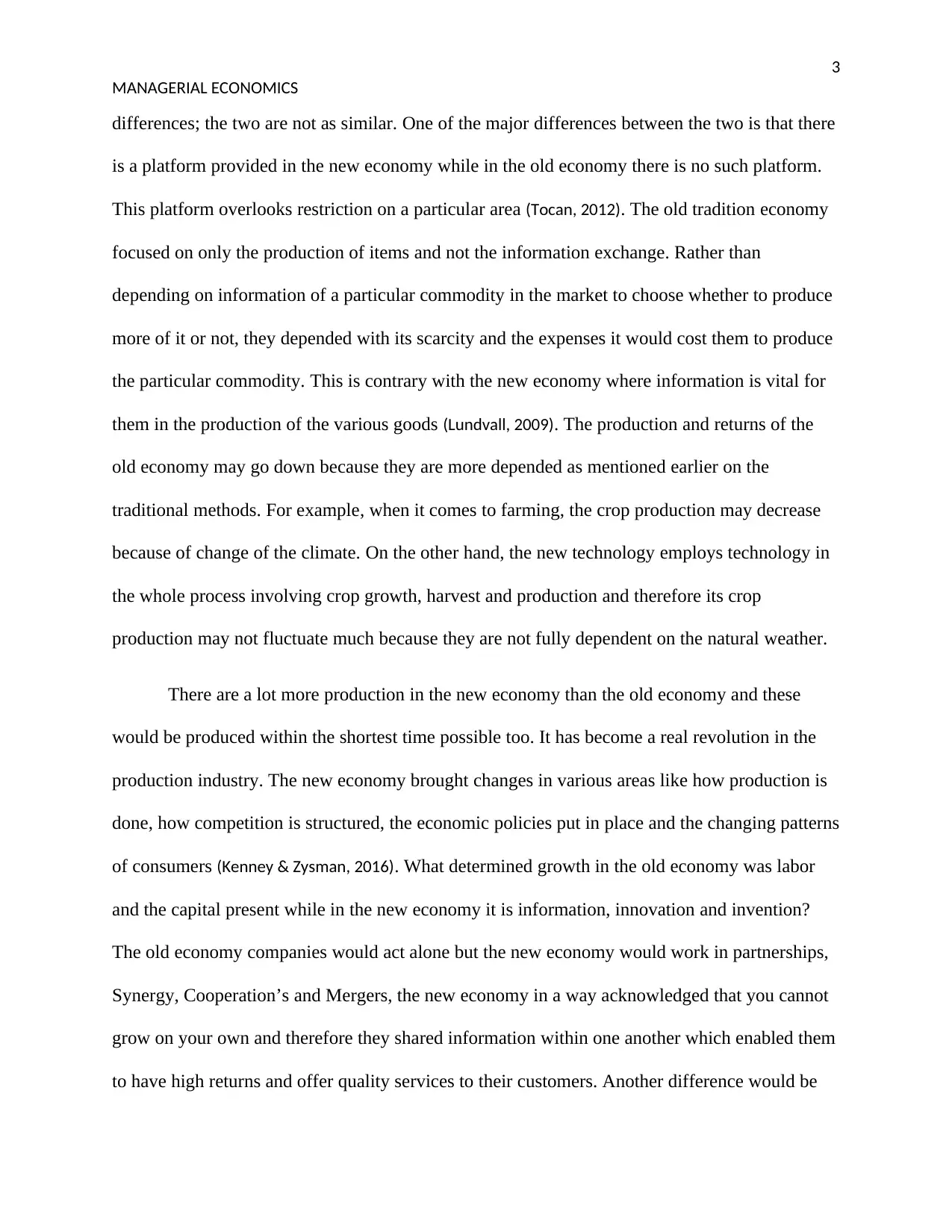
3
MANAGERIAL ECONOMICS
differences; the two are not as similar. One of the major differences between the two is that there
is a platform provided in the new economy while in the old economy there is no such platform.
This platform overlooks restriction on a particular area (Tocan, 2012). The old tradition economy
focused on only the production of items and not the information exchange. Rather than
depending on information of a particular commodity in the market to choose whether to produce
more of it or not, they depended with its scarcity and the expenses it would cost them to produce
the particular commodity. This is contrary with the new economy where information is vital for
them in the production of the various goods (Lundvall, 2009). The production and returns of the
old economy may go down because they are more depended as mentioned earlier on the
traditional methods. For example, when it comes to farming, the crop production may decrease
because of change of the climate. On the other hand, the new technology employs technology in
the whole process involving crop growth, harvest and production and therefore its crop
production may not fluctuate much because they are not fully dependent on the natural weather.
There are a lot more production in the new economy than the old economy and these
would be produced within the shortest time possible too. It has become a real revolution in the
production industry. The new economy brought changes in various areas like how production is
done, how competition is structured, the economic policies put in place and the changing patterns
of consumers (Kenney & Zysman, 2016). What determined growth in the old economy was labor
and the capital present while in the new economy it is information, innovation and invention?
The old economy companies would act alone but the new economy would work in partnerships,
Synergy, Cooperation’s and Mergers, the new economy in a way acknowledged that you cannot
grow on your own and therefore they shared information within one another which enabled them
to have high returns and offer quality services to their customers. Another difference would be
MANAGERIAL ECONOMICS
differences; the two are not as similar. One of the major differences between the two is that there
is a platform provided in the new economy while in the old economy there is no such platform.
This platform overlooks restriction on a particular area (Tocan, 2012). The old tradition economy
focused on only the production of items and not the information exchange. Rather than
depending on information of a particular commodity in the market to choose whether to produce
more of it or not, they depended with its scarcity and the expenses it would cost them to produce
the particular commodity. This is contrary with the new economy where information is vital for
them in the production of the various goods (Lundvall, 2009). The production and returns of the
old economy may go down because they are more depended as mentioned earlier on the
traditional methods. For example, when it comes to farming, the crop production may decrease
because of change of the climate. On the other hand, the new technology employs technology in
the whole process involving crop growth, harvest and production and therefore its crop
production may not fluctuate much because they are not fully dependent on the natural weather.
There are a lot more production in the new economy than the old economy and these
would be produced within the shortest time possible too. It has become a real revolution in the
production industry. The new economy brought changes in various areas like how production is
done, how competition is structured, the economic policies put in place and the changing patterns
of consumers (Kenney & Zysman, 2016). What determined growth in the old economy was labor
and the capital present while in the new economy it is information, innovation and invention?
The old economy companies would act alone but the new economy would work in partnerships,
Synergy, Cooperation’s and Mergers, the new economy in a way acknowledged that you cannot
grow on your own and therefore they shared information within one another which enabled them
to have high returns and offer quality services to their customers. Another difference would be
⊘ This is a preview!⊘
Do you want full access?
Subscribe today to unlock all pages.

Trusted by 1+ million students worldwide
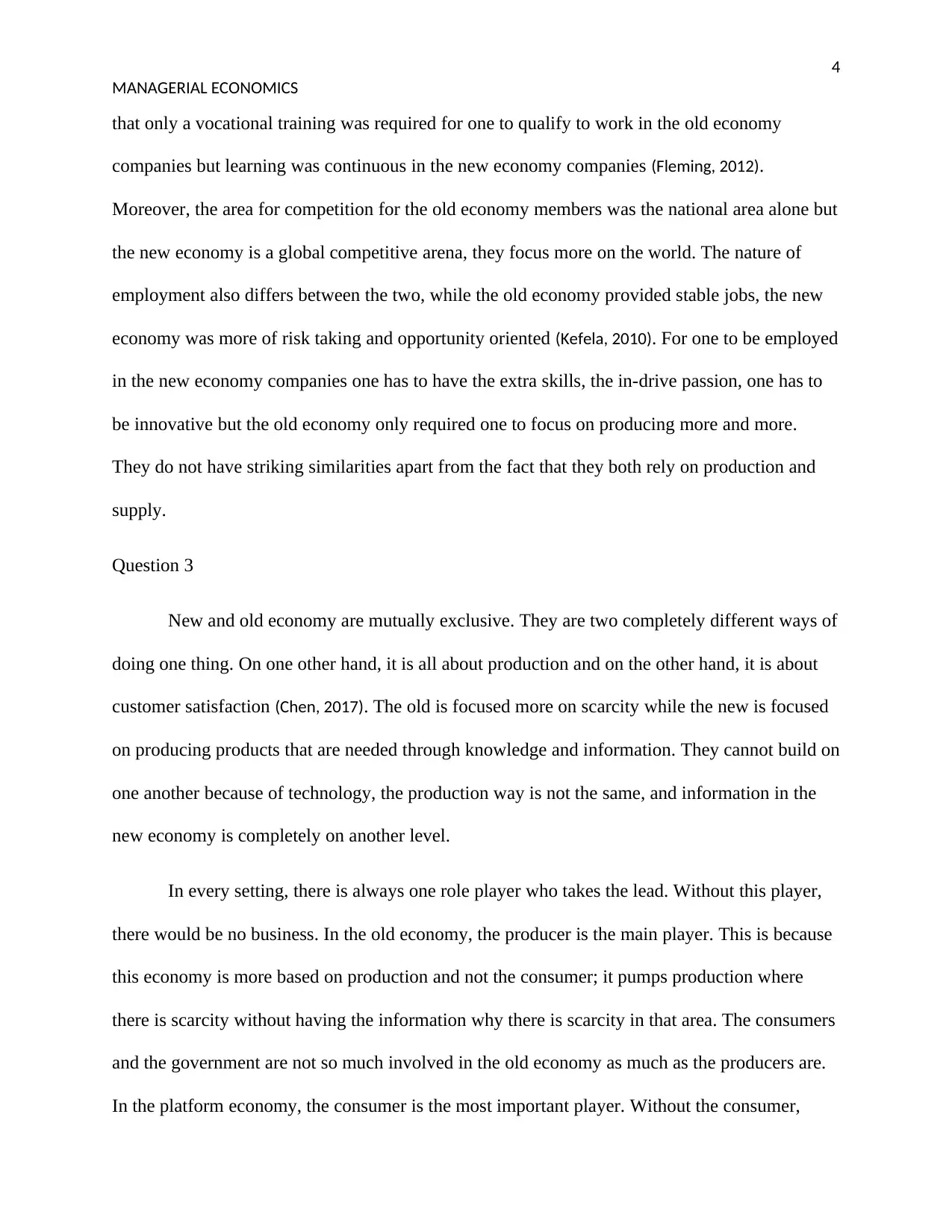
4
MANAGERIAL ECONOMICS
that only a vocational training was required for one to qualify to work in the old economy
companies but learning was continuous in the new economy companies (Fleming, 2012).
Moreover, the area for competition for the old economy members was the national area alone but
the new economy is a global competitive arena, they focus more on the world. The nature of
employment also differs between the two, while the old economy provided stable jobs, the new
economy was more of risk taking and opportunity oriented (Kefela, 2010). For one to be employed
in the new economy companies one has to have the extra skills, the in-drive passion, one has to
be innovative but the old economy only required one to focus on producing more and more.
They do not have striking similarities apart from the fact that they both rely on production and
supply.
Question 3
New and old economy are mutually exclusive. They are two completely different ways of
doing one thing. On one other hand, it is all about production and on the other hand, it is about
customer satisfaction (Chen, 2017). The old is focused more on scarcity while the new is focused
on producing products that are needed through knowledge and information. They cannot build on
one another because of technology, the production way is not the same, and information in the
new economy is completely on another level.
In every setting, there is always one role player who takes the lead. Without this player,
there would be no business. In the old economy, the producer is the main player. This is because
this economy is more based on production and not the consumer; it pumps production where
there is scarcity without having the information why there is scarcity in that area. The consumers
and the government are not so much involved in the old economy as much as the producers are.
In the platform economy, the consumer is the most important player. Without the consumer,
MANAGERIAL ECONOMICS
that only a vocational training was required for one to qualify to work in the old economy
companies but learning was continuous in the new economy companies (Fleming, 2012).
Moreover, the area for competition for the old economy members was the national area alone but
the new economy is a global competitive arena, they focus more on the world. The nature of
employment also differs between the two, while the old economy provided stable jobs, the new
economy was more of risk taking and opportunity oriented (Kefela, 2010). For one to be employed
in the new economy companies one has to have the extra skills, the in-drive passion, one has to
be innovative but the old economy only required one to focus on producing more and more.
They do not have striking similarities apart from the fact that they both rely on production and
supply.
Question 3
New and old economy are mutually exclusive. They are two completely different ways of
doing one thing. On one other hand, it is all about production and on the other hand, it is about
customer satisfaction (Chen, 2017). The old is focused more on scarcity while the new is focused
on producing products that are needed through knowledge and information. They cannot build on
one another because of technology, the production way is not the same, and information in the
new economy is completely on another level.
In every setting, there is always one role player who takes the lead. Without this player,
there would be no business. In the old economy, the producer is the main player. This is because
this economy is more based on production and not the consumer; it pumps production where
there is scarcity without having the information why there is scarcity in that area. The consumers
and the government are not so much involved in the old economy as much as the producers are.
In the platform economy, the consumer is the most important player. Without the consumer,
Paraphrase This Document
Need a fresh take? Get an instant paraphrase of this document with our AI Paraphraser
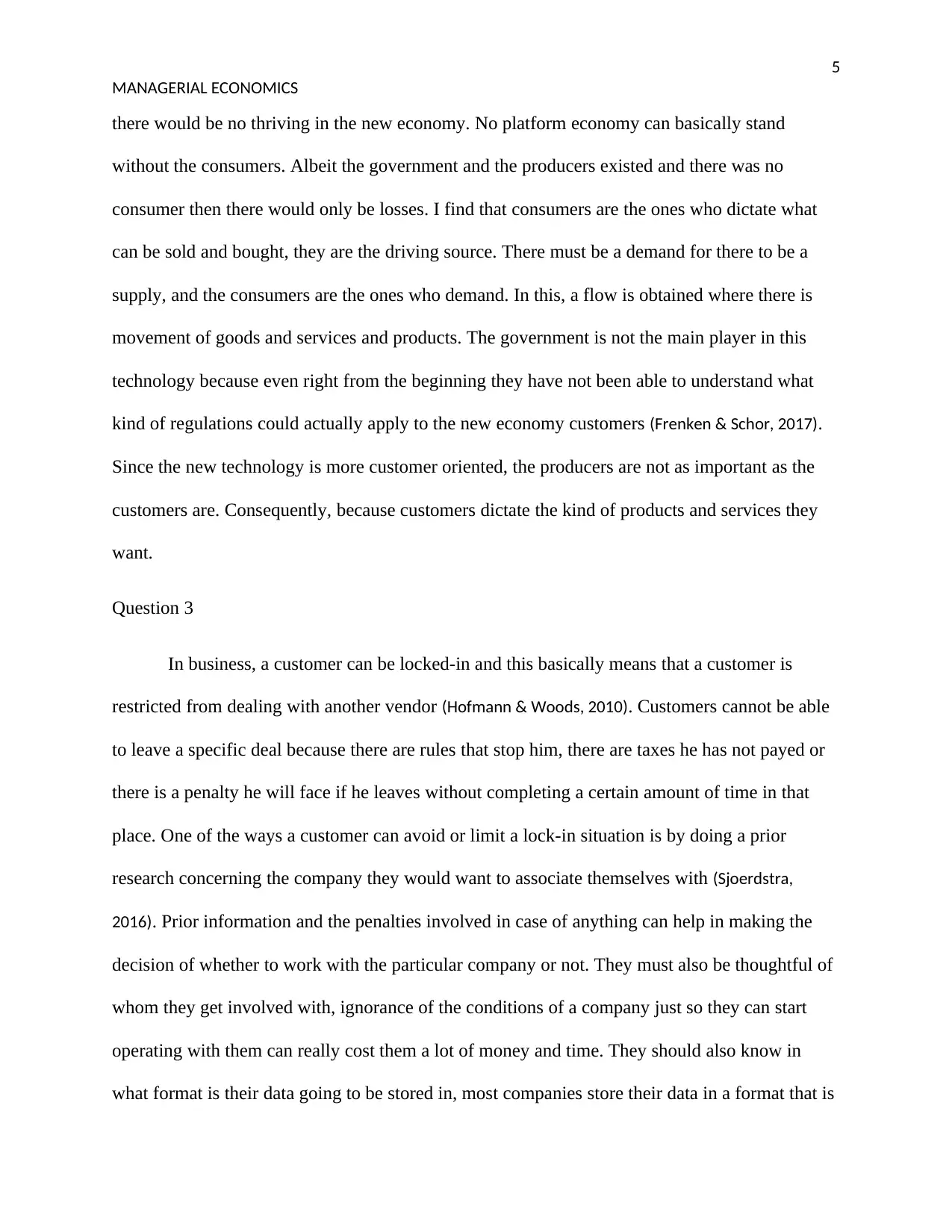
5
MANAGERIAL ECONOMICS
there would be no thriving in the new economy. No platform economy can basically stand
without the consumers. Albeit the government and the producers existed and there was no
consumer then there would only be losses. I find that consumers are the ones who dictate what
can be sold and bought, they are the driving source. There must be a demand for there to be a
supply, and the consumers are the ones who demand. In this, a flow is obtained where there is
movement of goods and services and products. The government is not the main player in this
technology because even right from the beginning they have not been able to understand what
kind of regulations could actually apply to the new economy customers (Frenken & Schor, 2017).
Since the new technology is more customer oriented, the producers are not as important as the
customers are. Consequently, because customers dictate the kind of products and services they
want.
Question 3
In business, a customer can be locked-in and this basically means that a customer is
restricted from dealing with another vendor (Hofmann & Woods, 2010). Customers cannot be able
to leave a specific deal because there are rules that stop him, there are taxes he has not payed or
there is a penalty he will face if he leaves without completing a certain amount of time in that
place. One of the ways a customer can avoid or limit a lock-in situation is by doing a prior
research concerning the company they would want to associate themselves with (Sjoerdstra,
2016). Prior information and the penalties involved in case of anything can help in making the
decision of whether to work with the particular company or not. They must also be thoughtful of
whom they get involved with, ignorance of the conditions of a company just so they can start
operating with them can really cost them a lot of money and time. They should also know in
what format is their data going to be stored in, most companies store their data in a format that is
MANAGERIAL ECONOMICS
there would be no thriving in the new economy. No platform economy can basically stand
without the consumers. Albeit the government and the producers existed and there was no
consumer then there would only be losses. I find that consumers are the ones who dictate what
can be sold and bought, they are the driving source. There must be a demand for there to be a
supply, and the consumers are the ones who demand. In this, a flow is obtained where there is
movement of goods and services and products. The government is not the main player in this
technology because even right from the beginning they have not been able to understand what
kind of regulations could actually apply to the new economy customers (Frenken & Schor, 2017).
Since the new technology is more customer oriented, the producers are not as important as the
customers are. Consequently, because customers dictate the kind of products and services they
want.
Question 3
In business, a customer can be locked-in and this basically means that a customer is
restricted from dealing with another vendor (Hofmann & Woods, 2010). Customers cannot be able
to leave a specific deal because there are rules that stop him, there are taxes he has not payed or
there is a penalty he will face if he leaves without completing a certain amount of time in that
place. One of the ways a customer can avoid or limit a lock-in situation is by doing a prior
research concerning the company they would want to associate themselves with (Sjoerdstra,
2016). Prior information and the penalties involved in case of anything can help in making the
decision of whether to work with the particular company or not. They must also be thoughtful of
whom they get involved with, ignorance of the conditions of a company just so they can start
operating with them can really cost them a lot of money and time. They should also know in
what format is their data going to be stored in, most companies store their data in a format that is
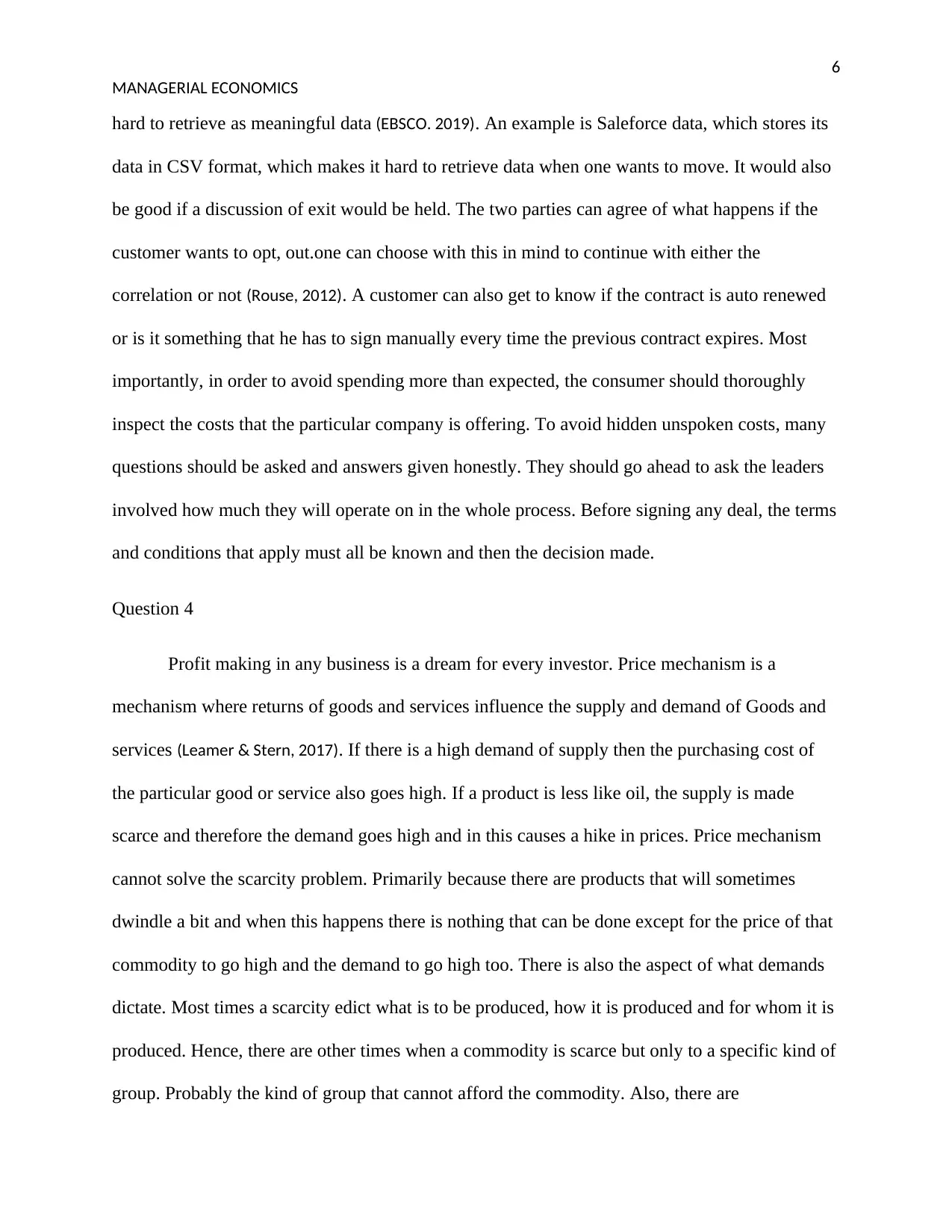
6
MANAGERIAL ECONOMICS
hard to retrieve as meaningful data (EBSCO. 2019). An example is Saleforce data, which stores its
data in CSV format, which makes it hard to retrieve data when one wants to move. It would also
be good if a discussion of exit would be held. The two parties can agree of what happens if the
customer wants to opt, out.one can choose with this in mind to continue with either the
correlation or not (Rouse, 2012). A customer can also get to know if the contract is auto renewed
or is it something that he has to sign manually every time the previous contract expires. Most
importantly, in order to avoid spending more than expected, the consumer should thoroughly
inspect the costs that the particular company is offering. To avoid hidden unspoken costs, many
questions should be asked and answers given honestly. They should go ahead to ask the leaders
involved how much they will operate on in the whole process. Before signing any deal, the terms
and conditions that apply must all be known and then the decision made.
Question 4
Profit making in any business is a dream for every investor. Price mechanism is a
mechanism where returns of goods and services influence the supply and demand of Goods and
services (Leamer & Stern, 2017). If there is a high demand of supply then the purchasing cost of
the particular good or service also goes high. If a product is less like oil, the supply is made
scarce and therefore the demand goes high and in this causes a hike in prices. Price mechanism
cannot solve the scarcity problem. Primarily because there are products that will sometimes
dwindle a bit and when this happens there is nothing that can be done except for the price of that
commodity to go high and the demand to go high too. There is also the aspect of what demands
dictate. Most times a scarcity edict what is to be produced, how it is produced and for whom it is
produced. Hence, there are other times when a commodity is scarce but only to a specific kind of
group. Probably the kind of group that cannot afford the commodity. Also, there are
MANAGERIAL ECONOMICS
hard to retrieve as meaningful data (EBSCO. 2019). An example is Saleforce data, which stores its
data in CSV format, which makes it hard to retrieve data when one wants to move. It would also
be good if a discussion of exit would be held. The two parties can agree of what happens if the
customer wants to opt, out.one can choose with this in mind to continue with either the
correlation or not (Rouse, 2012). A customer can also get to know if the contract is auto renewed
or is it something that he has to sign manually every time the previous contract expires. Most
importantly, in order to avoid spending more than expected, the consumer should thoroughly
inspect the costs that the particular company is offering. To avoid hidden unspoken costs, many
questions should be asked and answers given honestly. They should go ahead to ask the leaders
involved how much they will operate on in the whole process. Before signing any deal, the terms
and conditions that apply must all be known and then the decision made.
Question 4
Profit making in any business is a dream for every investor. Price mechanism is a
mechanism where returns of goods and services influence the supply and demand of Goods and
services (Leamer & Stern, 2017). If there is a high demand of supply then the purchasing cost of
the particular good or service also goes high. If a product is less like oil, the supply is made
scarce and therefore the demand goes high and in this causes a hike in prices. Price mechanism
cannot solve the scarcity problem. Primarily because there are products that will sometimes
dwindle a bit and when this happens there is nothing that can be done except for the price of that
commodity to go high and the demand to go high too. There is also the aspect of what demands
dictate. Most times a scarcity edict what is to be produced, how it is produced and for whom it is
produced. Hence, there are other times when a commodity is scarce but only to a specific kind of
group. Probably the kind of group that cannot afford the commodity. Also, there are
⊘ This is a preview!⊘
Do you want full access?
Subscribe today to unlock all pages.

Trusted by 1+ million students worldwide
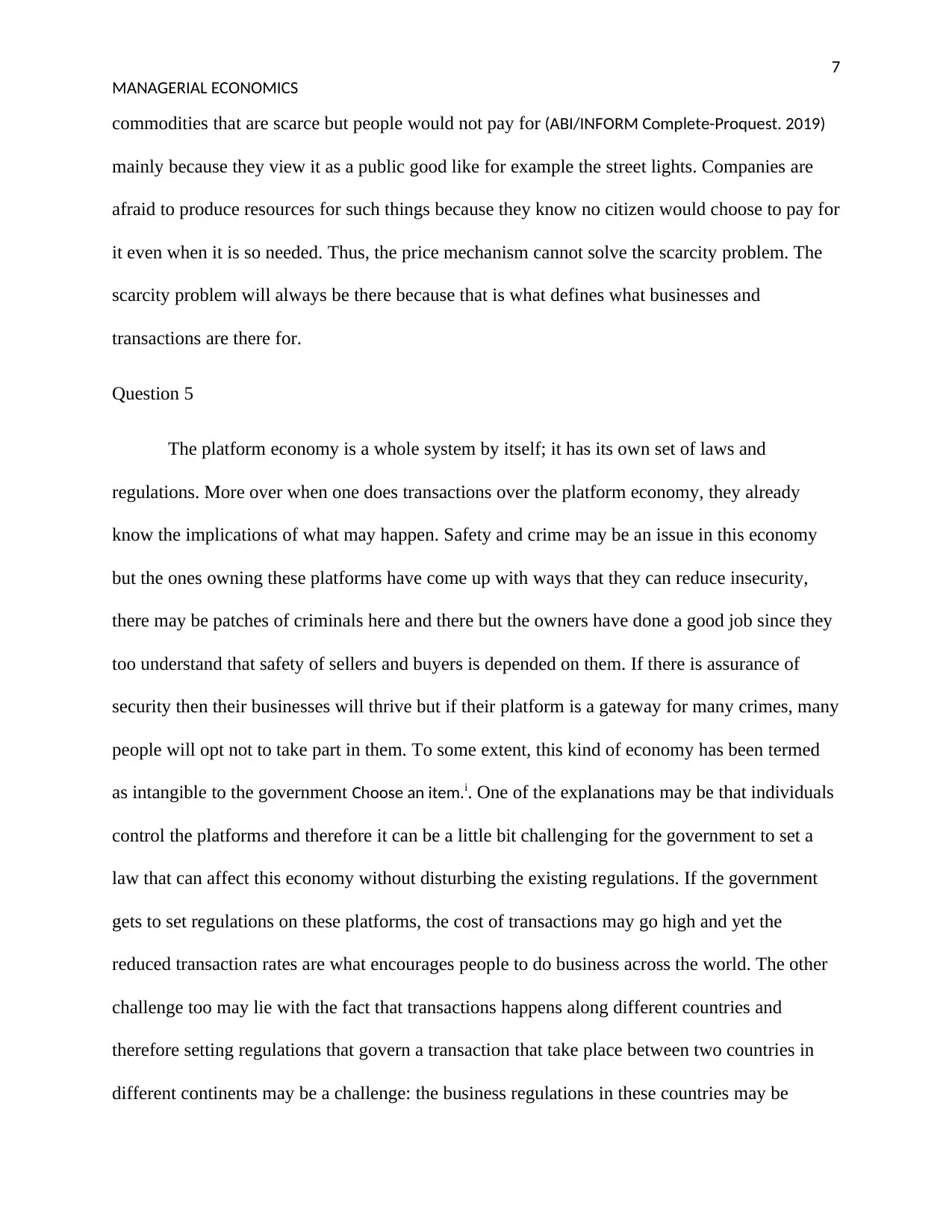
7
MANAGERIAL ECONOMICS
commodities that are scarce but people would not pay for (ABI/INFORM Complete-Proquest. 2019)
mainly because they view it as a public good like for example the street lights. Companies are
afraid to produce resources for such things because they know no citizen would choose to pay for
it even when it is so needed. Thus, the price mechanism cannot solve the scarcity problem. The
scarcity problem will always be there because that is what defines what businesses and
transactions are there for.
Question 5
The platform economy is a whole system by itself; it has its own set of laws and
regulations. More over when one does transactions over the platform economy, they already
know the implications of what may happen. Safety and crime may be an issue in this economy
but the ones owning these platforms have come up with ways that they can reduce insecurity,
there may be patches of criminals here and there but the owners have done a good job since they
too understand that safety of sellers and buyers is depended on them. If there is assurance of
security then their businesses will thrive but if their platform is a gateway for many crimes, many
people will opt not to take part in them. To some extent, this kind of economy has been termed
as intangible to the government Choose an item.i. One of the explanations may be that individuals
control the platforms and therefore it can be a little bit challenging for the government to set a
law that can affect this economy without disturbing the existing regulations. If the government
gets to set regulations on these platforms, the cost of transactions may go high and yet the
reduced transaction rates are what encourages people to do business across the world. The other
challenge too may lie with the fact that transactions happens along different countries and
therefore setting regulations that govern a transaction that take place between two countries in
different continents may be a challenge: the business regulations in these countries may be
MANAGERIAL ECONOMICS
commodities that are scarce but people would not pay for (ABI/INFORM Complete-Proquest. 2019)
mainly because they view it as a public good like for example the street lights. Companies are
afraid to produce resources for such things because they know no citizen would choose to pay for
it even when it is so needed. Thus, the price mechanism cannot solve the scarcity problem. The
scarcity problem will always be there because that is what defines what businesses and
transactions are there for.
Question 5
The platform economy is a whole system by itself; it has its own set of laws and
regulations. More over when one does transactions over the platform economy, they already
know the implications of what may happen. Safety and crime may be an issue in this economy
but the ones owning these platforms have come up with ways that they can reduce insecurity,
there may be patches of criminals here and there but the owners have done a good job since they
too understand that safety of sellers and buyers is depended on them. If there is assurance of
security then their businesses will thrive but if their platform is a gateway for many crimes, many
people will opt not to take part in them. To some extent, this kind of economy has been termed
as intangible to the government Choose an item.i. One of the explanations may be that individuals
control the platforms and therefore it can be a little bit challenging for the government to set a
law that can affect this economy without disturbing the existing regulations. If the government
gets to set regulations on these platforms, the cost of transactions may go high and yet the
reduced transaction rates are what encourages people to do business across the world. The other
challenge too may lie with the fact that transactions happens along different countries and
therefore setting regulations that govern a transaction that take place between two countries in
different continents may be a challenge: the business regulations in these countries may be
Paraphrase This Document
Need a fresh take? Get an instant paraphrase of this document with our AI Paraphraser
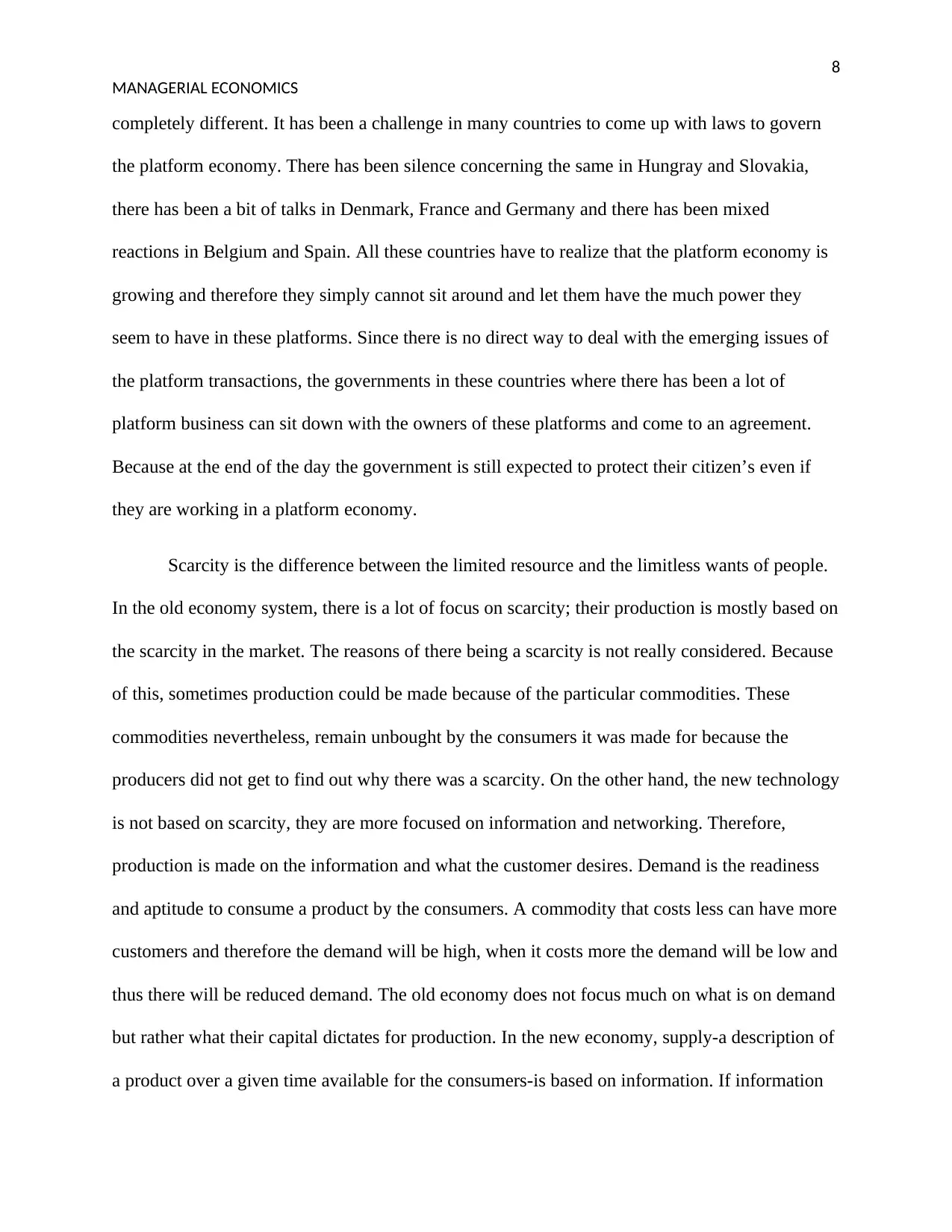
8
MANAGERIAL ECONOMICS
completely different. It has been a challenge in many countries to come up with laws to govern
the platform economy. There has been silence concerning the same in Hungray and Slovakia,
there has been a bit of talks in Denmark, France and Germany and there has been mixed
reactions in Belgium and Spain. All these countries have to realize that the platform economy is
growing and therefore they simply cannot sit around and let them have the much power they
seem to have in these platforms. Since there is no direct way to deal with the emerging issues of
the platform transactions, the governments in these countries where there has been a lot of
platform business can sit down with the owners of these platforms and come to an agreement.
Because at the end of the day the government is still expected to protect their citizen’s even if
they are working in a platform economy.
Scarcity is the difference between the limited resource and the limitless wants of people.
In the old economy system, there is a lot of focus on scarcity; their production is mostly based on
the scarcity in the market. The reasons of there being a scarcity is not really considered. Because
of this, sometimes production could be made because of the particular commodities. These
commodities nevertheless, remain unbought by the consumers it was made for because the
producers did not get to find out why there was a scarcity. On the other hand, the new technology
is not based on scarcity, they are more focused on information and networking. Therefore,
production is made on the information and what the customer desires. Demand is the readiness
and aptitude to consume a product by the consumers. A commodity that costs less can have more
customers and therefore the demand will be high, when it costs more the demand will be low and
thus there will be reduced demand. The old economy does not focus much on what is on demand
but rather what their capital dictates for production. In the new economy, supply-a description of
a product over a given time available for the consumers-is based on information. If information
MANAGERIAL ECONOMICS
completely different. It has been a challenge in many countries to come up with laws to govern
the platform economy. There has been silence concerning the same in Hungray and Slovakia,
there has been a bit of talks in Denmark, France and Germany and there has been mixed
reactions in Belgium and Spain. All these countries have to realize that the platform economy is
growing and therefore they simply cannot sit around and let them have the much power they
seem to have in these platforms. Since there is no direct way to deal with the emerging issues of
the platform transactions, the governments in these countries where there has been a lot of
platform business can sit down with the owners of these platforms and come to an agreement.
Because at the end of the day the government is still expected to protect their citizen’s even if
they are working in a platform economy.
Scarcity is the difference between the limited resource and the limitless wants of people.
In the old economy system, there is a lot of focus on scarcity; their production is mostly based on
the scarcity in the market. The reasons of there being a scarcity is not really considered. Because
of this, sometimes production could be made because of the particular commodities. These
commodities nevertheless, remain unbought by the consumers it was made for because the
producers did not get to find out why there was a scarcity. On the other hand, the new technology
is not based on scarcity, they are more focused on information and networking. Therefore,
production is made on the information and what the customer desires. Demand is the readiness
and aptitude to consume a product by the consumers. A commodity that costs less can have more
customers and therefore the demand will be high, when it costs more the demand will be low and
thus there will be reduced demand. The old economy does not focus much on what is on demand
but rather what their capital dictates for production. In the new economy, supply-a description of
a product over a given time available for the consumers-is based on information. If information
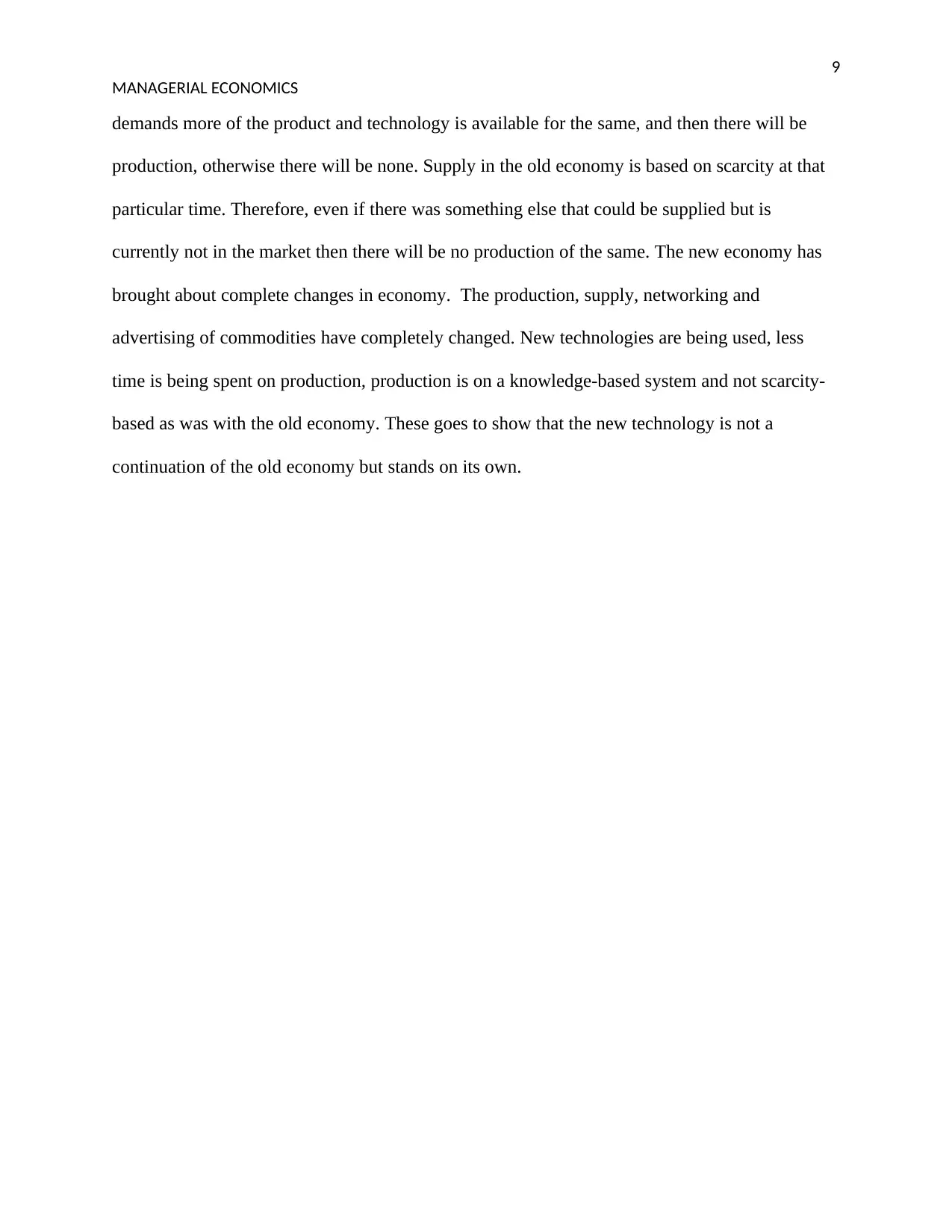
9
MANAGERIAL ECONOMICS
demands more of the product and technology is available for the same, and then there will be
production, otherwise there will be none. Supply in the old economy is based on scarcity at that
particular time. Therefore, even if there was something else that could be supplied but is
currently not in the market then there will be no production of the same. The new economy has
brought about complete changes in economy. The production, supply, networking and
advertising of commodities have completely changed. New technologies are being used, less
time is being spent on production, production is on a knowledge-based system and not scarcity-
based as was with the old economy. These goes to show that the new technology is not a
continuation of the old economy but stands on its own.
MANAGERIAL ECONOMICS
demands more of the product and technology is available for the same, and then there will be
production, otherwise there will be none. Supply in the old economy is based on scarcity at that
particular time. Therefore, even if there was something else that could be supplied but is
currently not in the market then there will be no production of the same. The new economy has
brought about complete changes in economy. The production, supply, networking and
advertising of commodities have completely changed. New technologies are being used, less
time is being spent on production, production is on a knowledge-based system and not scarcity-
based as was with the old economy. These goes to show that the new technology is not a
continuation of the old economy but stands on its own.
⊘ This is a preview!⊘
Do you want full access?
Subscribe today to unlock all pages.

Trusted by 1+ million students worldwide
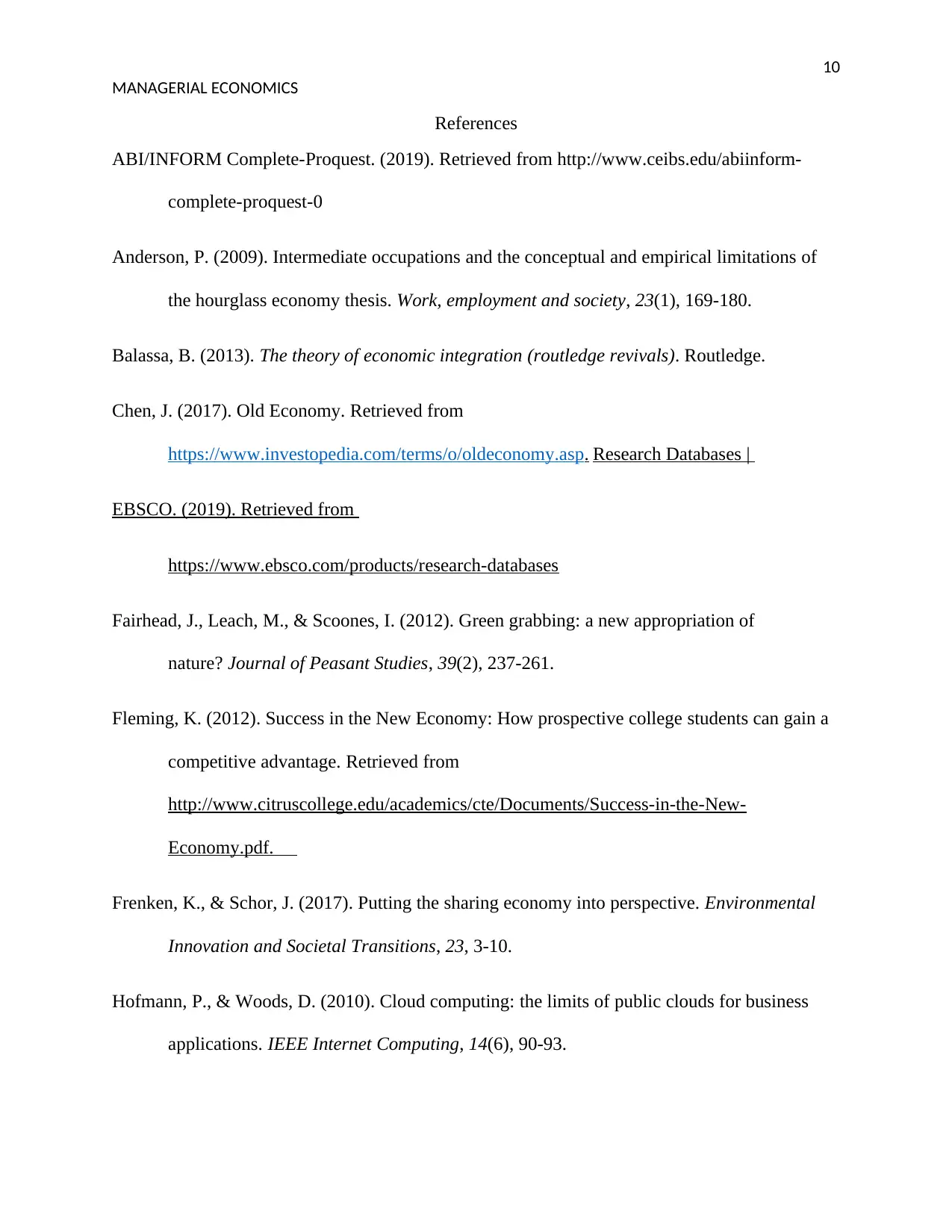
10
MANAGERIAL ECONOMICS
References
ABI/INFORM Complete-Proquest. (2019). Retrieved from http://www.ceibs.edu/abiinform-
complete-proquest-0
Anderson, P. (2009). Intermediate occupations and the conceptual and empirical limitations of
the hourglass economy thesis. Work, employment and society, 23(1), 169-180.
Balassa, B. (2013). The theory of economic integration (routledge revivals). Routledge.
Chen, J. (2017). Old Economy. Retrieved from
https://www.investopedia.com/terms/o/oldeconomy.asp. Research Databases |
EBSCO. (2019). Retrieved from
https://www.ebsco.com/products/research-databases
Fairhead, J., Leach, M., & Scoones, I. (2012). Green grabbing: a new appropriation of
nature? Journal of Peasant Studies, 39(2), 237-261.
Fleming, K. (2012). Success in the New Economy: How prospective college students can gain a
competitive advantage. Retrieved from
http://www.citruscollege.edu/academics/cte/Documents/Success-in-the-New-
Economy.pdf.
Frenken, K., & Schor, J. (2017). Putting the sharing economy into perspective. Environmental
Innovation and Societal Transitions, 23, 3-10.
Hofmann, P., & Woods, D. (2010). Cloud computing: the limits of public clouds for business
applications. IEEE Internet Computing, 14(6), 90-93.
MANAGERIAL ECONOMICS
References
ABI/INFORM Complete-Proquest. (2019). Retrieved from http://www.ceibs.edu/abiinform-
complete-proquest-0
Anderson, P. (2009). Intermediate occupations and the conceptual and empirical limitations of
the hourglass economy thesis. Work, employment and society, 23(1), 169-180.
Balassa, B. (2013). The theory of economic integration (routledge revivals). Routledge.
Chen, J. (2017). Old Economy. Retrieved from
https://www.investopedia.com/terms/o/oldeconomy.asp. Research Databases |
EBSCO. (2019). Retrieved from
https://www.ebsco.com/products/research-databases
Fairhead, J., Leach, M., & Scoones, I. (2012). Green grabbing: a new appropriation of
nature? Journal of Peasant Studies, 39(2), 237-261.
Fleming, K. (2012). Success in the New Economy: How prospective college students can gain a
competitive advantage. Retrieved from
http://www.citruscollege.edu/academics/cte/Documents/Success-in-the-New-
Economy.pdf.
Frenken, K., & Schor, J. (2017). Putting the sharing economy into perspective. Environmental
Innovation and Societal Transitions, 23, 3-10.
Hofmann, P., & Woods, D. (2010). Cloud computing: the limits of public clouds for business
applications. IEEE Internet Computing, 14(6), 90-93.
Paraphrase This Document
Need a fresh take? Get an instant paraphrase of this document with our AI Paraphraser
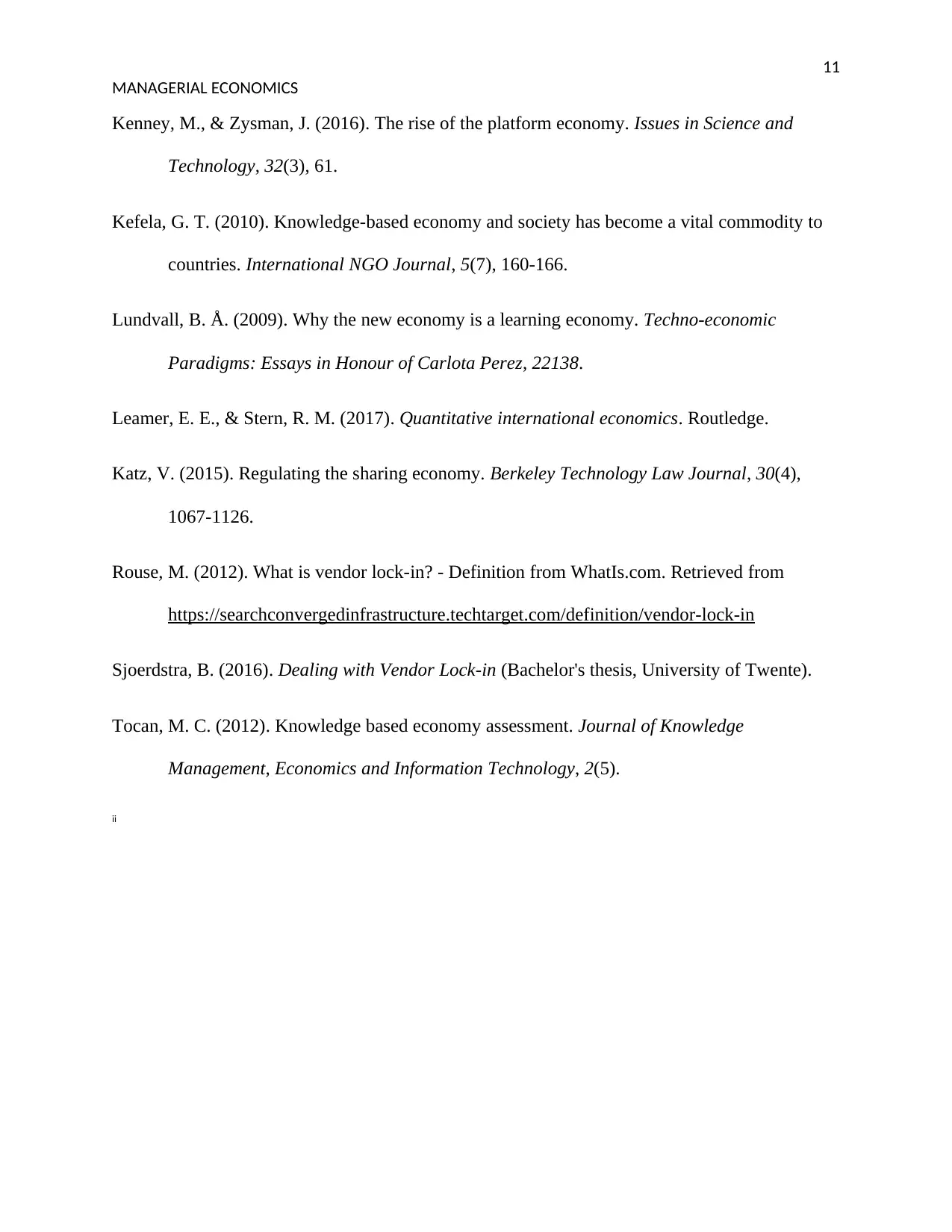
11
MANAGERIAL ECONOMICS
Kenney, M., & Zysman, J. (2016). The rise of the platform economy. Issues in Science and
Technology, 32(3), 61.
Kefela, G. T. (2010). Knowledge-based economy and society has become a vital commodity to
countries. International NGO Journal, 5(7), 160-166.
Lundvall, B. Å. (2009). Why the new economy is a learning economy. Techno-economic
Paradigms: Essays in Honour of Carlota Perez, 22138.
Leamer, E. E., & Stern, R. M. (2017). Quantitative international economics. Routledge.
Katz, V. (2015). Regulating the sharing economy. Berkeley Technology Law Journal, 30(4),
1067-1126.
Rouse, M. (2012). What is vendor lock-in? - Definition from WhatIs.com. Retrieved from
https://searchconvergedinfrastructure.techtarget.com/definition/vendor-lock-in
Sjoerdstra, B. (2016). Dealing with Vendor Lock-in (Bachelor's thesis, University of Twente).
Tocan, M. C. (2012). Knowledge based economy assessment. Journal of Knowledge
Management, Economics and Information Technology, 2(5).
ii
MANAGERIAL ECONOMICS
Kenney, M., & Zysman, J. (2016). The rise of the platform economy. Issues in Science and
Technology, 32(3), 61.
Kefela, G. T. (2010). Knowledge-based economy and society has become a vital commodity to
countries. International NGO Journal, 5(7), 160-166.
Lundvall, B. Å. (2009). Why the new economy is a learning economy. Techno-economic
Paradigms: Essays in Honour of Carlota Perez, 22138.
Leamer, E. E., & Stern, R. M. (2017). Quantitative international economics. Routledge.
Katz, V. (2015). Regulating the sharing economy. Berkeley Technology Law Journal, 30(4),
1067-1126.
Rouse, M. (2012). What is vendor lock-in? - Definition from WhatIs.com. Retrieved from
https://searchconvergedinfrastructure.techtarget.com/definition/vendor-lock-in
Sjoerdstra, B. (2016). Dealing with Vendor Lock-in (Bachelor's thesis, University of Twente).
Tocan, M. C. (2012). Knowledge based economy assessment. Journal of Knowledge
Management, Economics and Information Technology, 2(5).
ii
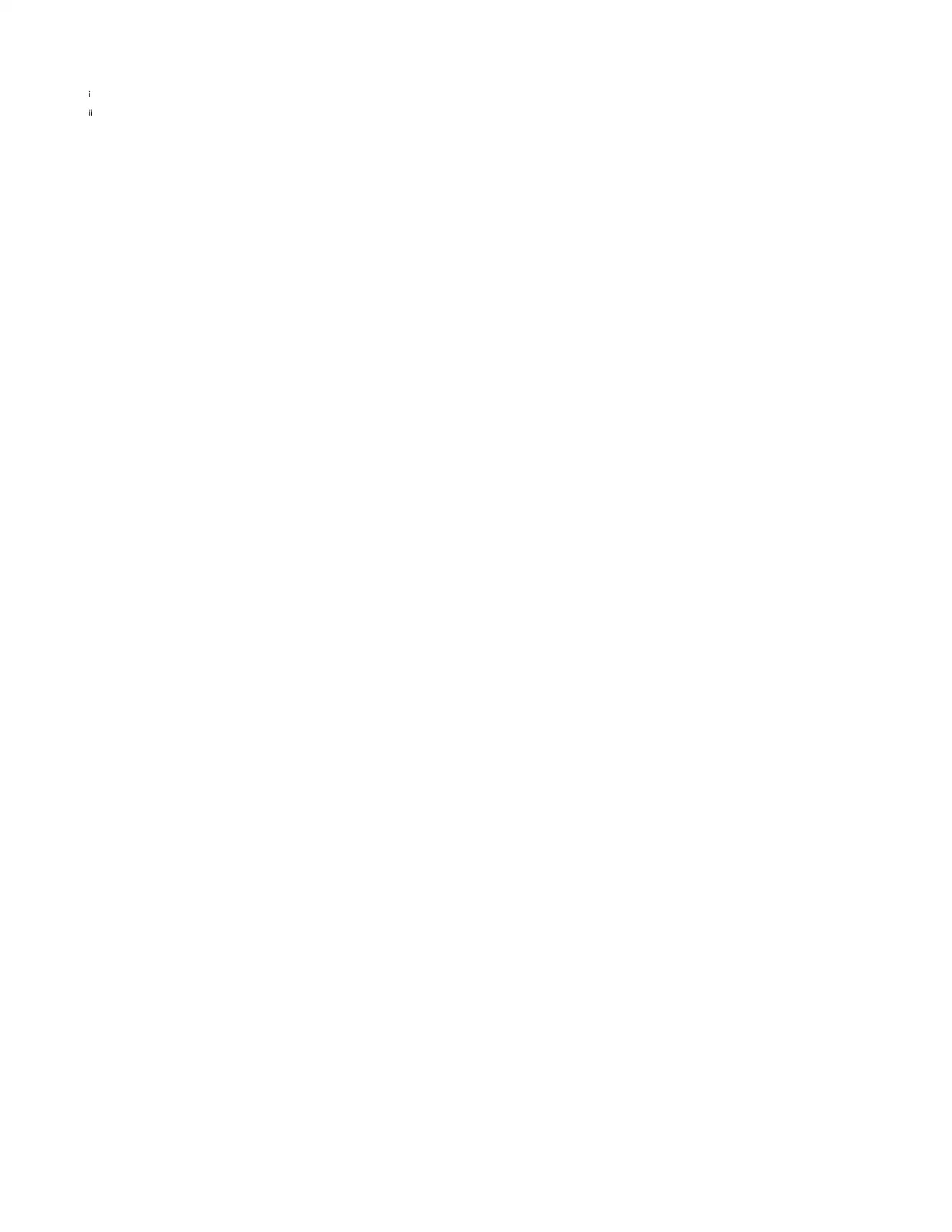
i
ii
ii
⊘ This is a preview!⊘
Do you want full access?
Subscribe today to unlock all pages.

Trusted by 1+ million students worldwide
1 out of 12
Related Documents
Your All-in-One AI-Powered Toolkit for Academic Success.
+13062052269
info@desklib.com
Available 24*7 on WhatsApp / Email
![[object Object]](/_next/static/media/star-bottom.7253800d.svg)
Unlock your academic potential
Copyright © 2020–2026 A2Z Services. All Rights Reserved. Developed and managed by ZUCOL.





